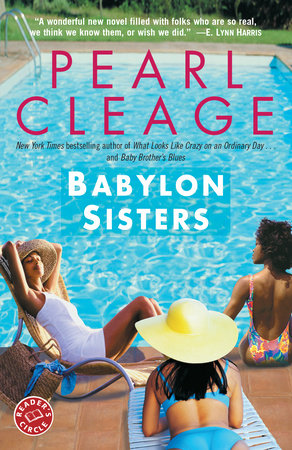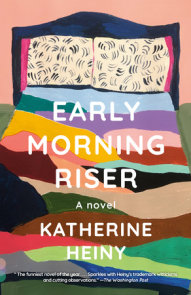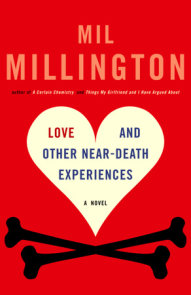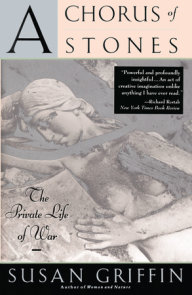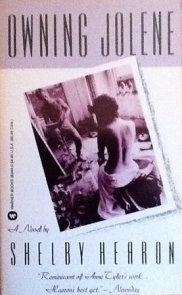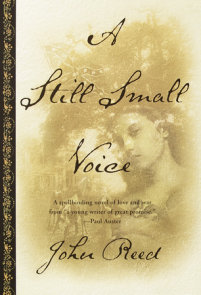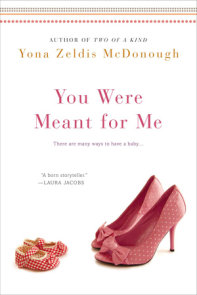READERS GUIDE
Questions and Topics for Discussion
1. “Even then, before I had a clue about how hard it is to actually raise a sane and loving child in a brutally insane, often unlovely world, I knew that was my goal. I wanted to be a good hands-on mother. A rocker was the first step, and I sat in twelve chairs before I found the right one.” (p. 17) Catherine wanted to be “a good hands-on mother” so she bought a rocking chair. What did the rocking chair represent for Catherine? Do you think growing up with an unconventional mother and father made her want to embrace the more traditional motherhood symbols even as she herself set out on an equally unconventional path?
2. “There is a theory,” she said, slowly, “that women’s romantic relationships with men are totally shaped by their fathers. If it’s a bad relationship, those women will seek out men who are like the father over and over in order to see if they can resolve issues that began in early childhood.” (p. 18) Do you think there’s any truth to this theory? If so, is there anything women with less than positive relationships with their fathers can do to break the cycle?
3. Do you think it was fair for Catherine not to tell B.J. when she decided not to have an abortion? What other ways could she have approached her decision making that might have been better or did she pick the best course of action?
4. “I pretended that was fine with me because I knew his freedom was as important to him as his work, and the idea that he would sacrifice or even modify either one because we happened to fall in love never entered his mind.” (p. 20) Catherine admits that she pretended she didn’t mind the separation that was looming after she and B.J. finished college and began to pursue their individual careers. Why do you think she felt the need to pretend rather than share her real feelings with B.J.? Do you think this is a familiar pattern in many romantic relationships and how does it effect their ultimate outcome?
5. “My generation is still struggling to find the balance between love and freedom, sex and romance, family and career. Sometimes we get it right, but more often, we don’t.” (p. 21) How do you feel about Catherine’s observation that her generation is “still struggling” with these important questions? Is this struggle a challenge in your own life? How do you think women address these questions in their daily lives, personally and professionally?
6. “As my mother told me once when I was quoting Gloria Steinem as the ultimate authority on all things feminist, ‘What you have to understand is that colored women weren’t involved in the women’s movement. We were the women who moved!’” (p. 21) What do you think Catherine’s mother meant by that? Do you feel that the women’s movement changed the lives of American women? Were those changes positive or negative?
7. “This is what I get for sending her to private school with a bunch of rich white girls. From what Phoebe says, they talk to their mothers any kind of way, and their mamas let them, but this conversation was over. I stood up.” (p. 23) Catherine takes pride in Phoebe’s scholastic achievements, but has some ambivalence about her interaction with white female students at Northfield Academy. Do you think African American women relate to their daughters differently than other mothers?
8. “A lie is never the best you can do, even when you tell yourself it is. It’s a way of buying some breathing room until you can work up enough courage to tell the truth.” (p. 24) The necessity to tell the truth even when it’s difficult runs through this book. Characters are encouraged to tell the truth and rewarded when they do so. Do you think lying is ever justified between people who say they love each other? Under what circumstances would you lie to a friend or loved one?
9. This is the second novel Pearl has set in Atlanta’s West End community. Admittedly idealizing the neighborhood she loves, she has said “I write about my neighborhood, but better.” What do you think she means by this? What do you think about the role played by Blue Hamilton in the neighborhood? Do you think you could call him a friend the way Catherine says she is proud to do?
10. “Louis had limitless patience for Phoebe’s dramas, major and minor. I probably wouldn’t have survived her adolescence without him, and tonight he was just the port in a storm she needed.” (p. 30) Catherine is determined to provide Phoebe with an extended surrogate family, even if she won’t tell her about her father. How important is the role Louis plays in Phoebe and Catherine’s lives? How successful is Catherine in her effort to make a family for her daughter?
11. “She probably wasn’t much taller than I was, but it wasn’t about height. There was a real presence, an almost palpable strength, rolling off her in waves. I couldn’t imagine trying to tell her no.” (p. 44) Ezola Mandeville is a complicated woman who intrigues Catherine and sometimes infuriates her. What was your initial impression of Miss Mandeville? When she “tests” Catherine by casually using the phrase “sorry black bitches,” how did you react to her words? Did her explanation change your impression?
12. “The history of black female activism is littered with tired feet, sore backs, one too many demands from the mistress or master of the house, one too many off days canceled at the last minute, one too many boxes of old clothes instead of a raise in pay.” (p. 47) How do you feel about Catherine’s observations about black female activism? Is this still true today or have things that make African American women activists changed as professional opportunities expand? What does it mean to be an activist? Would you use the term to describe yourself?
13. “And that,” she said, “is what all this is about. Bearing witness for Bessie by looking out for all the hardworking colored women people never even see. That’s why I do what I do, and if you decide to come and work for me, that’s what you’ll be doing, too.” (p. 50) Richard Wright’s classic novel, Native Son, was the catalyst that helped Ezola find her life’s work, “bearing witness for Bessie.” How did you feel about her analysis of Wright’s book? Do you think the African American male characters in fiction are held accountable for their behavior toward African American women? What do you think about the issue of “male bashing?” Is it relevant to discussions of fiction written by African American women writers?
14. “Why don’t you go down to the pool and leave the people’s revolution to the people?” (p. 50) How do you think Catherine’s father’s feelings about social change affected her choice to devote her life to helping immigrants and refugee women and children? Did your parents’ way of looking at the world directly influence your choices, personal or professional?
15. Listening to a discussion of American Idol winner Ruben Studdard on black talk radio, Catherine considers the role race plays in the African American community and wishes the level of exchange could be updated to include all the progress of the last forty years. What do you think about her wish that we had a “bigger world view”? Is race still as important a consideration as it was in the 1960s? Has anything changed, for better or for worse?
16. “The Sentinel was a losing proposition economically, but for Louis it was both a legacy and a labor of love. Imagining Louis without the Sentinel was like imagining Louis without his lopsided grin. Impossible.” (p. 56) Louis Adams’s father, Louis, Sr., founded the paper in l964 to “tell the truth to the people.” Is that truth telling still the primary mission of the black press? Do you think that role should change or is it still important to the African American community? What do you think Louis would think about the programming on BET?
17. Catherine’s attempts to meet single men after B.J. was out of her life are one disaster after another. (p. 59). Do you think the men she dated were as bad as she remembers them or that a part of her was still waiting for B.J. to return?
18. Women of various ages forge friendships in this book, including Miss Iona and Miriam, Amelia and Phoebe, and the members of the Babylon Sisters Book Club. Why do you think Pearl included these cross generational friendships? Do you have regular contact with women older and younger than you are? Do you think such relationships are important?
19. Louis and Catherine have been friends since birth. How hard is it to maintain a friendship with a man when there is no romance involved? Do you think Louis is a good friend to B.J.? Should he have told him about Phoebe? How difficult is it to keep a friend’s secrets when those secrets may be hurting another friend?
20. What questions does the book raise about the responsibility of mothers and fathers to work out their differences amicably for the sake of their children? Is it always possible to do this?
21. B.J. was delighted to learn that he had a daughter and confesses he never wanted Catherine to have an abortion. Do you think their relationship would have been different if he had been able to tell her this? Did his reaction to hearing about Phoebe surprise you?
22. Miriam’s story of leaving Haiti at night with a group of other terrified refugees is one Catherine has heard before in her work. Was Miriam’s story familiar to you? (p. 88—89). Can you picture yourself in the role of Miriam’s mother? Do you think she made the best choice for her children in spite of the danger she placed them in? Is it a choice you could have made?
23. Did the book’s emphasis on mothers and daughters around the world make you think about all the at-risk women and children struggling with war and famine and political upheaval in their home countries? Pearl has said she thinks it is important for women to “think of everybody’s children as our children.” How can this thought be translated into reality?
24. Amelia says she fell in love with Louis after taking him to a Sweet Honey concert. (p. 101). She loved his ability to be surrounded by so much female energy and not become uncomfortable. Have you ever had this kind of sisterhood experience? Were the men present able to enjoy it? What did their behavior tell you about them?
25. When Sam Hall tells Catherine that the educational program Busy Boy Baker has committed to is a public relations ploy more than anything else, she’s surprised at his cynicism. When he later tells her why he is so cynical (p. 132), did it make you feel differently about him? What do you think of his characterization of the poor people who wrecked his rental property as “niggers”? Is it more or less offensive for African Americans to use this term than for other groups to use it?
26. When Catherine and B.J. meet for dinner, she is determined not to allow him to direct their conversation to the past. (p. 151) Did she overreact by walking out when he kept trying to apologize and explain?
27. Catherine is able to think of herself as a “citizen of the world.” Do you think of yourself that way? Is it desirable or just distracting, considering the number of challenges we face right here at home?
28. Do you think Catherine and the girls could have come up with a plan to save themselves if B.J., Louis, and the police had not arrived? Why do you think the author stages a rescue before they have time to do something on their own?
29. How does it challenge our ideas of sisterhood to encounter a villain like Ezola Mandeville? What would your reaction be if you met someone like Ezola in life? Do you think it would take longer for you to suspect her motives because she is an African American female?






